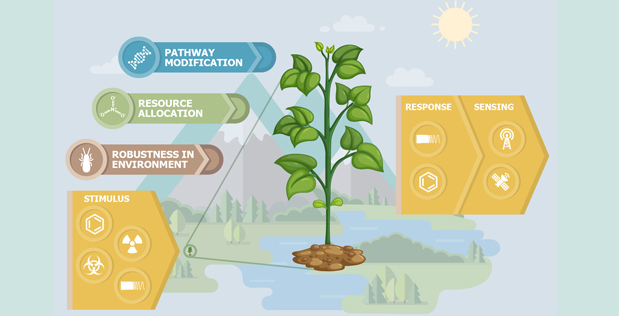In combat, unconventional sources of intelligence can provide a major advantage when completing a mission and keeping troops safe. DARPA is now working on a technology that could enable the military to gain tactical insight from a very unexpected source: plants.  Image Source: Wikimedia Detecting Hazards In The Field By modifying the genes of certain plants, the Defense Department hopes they can be turned into valuable indicators of battlefield conditions, such as the presence of chemicals, pathogens, radiation, and even buried explosive devices. Such capability would rely on plants’ natural responses to environmental changes and various stimuli. DARPA has devoted a new program, Advanced Plant Technologies (APT), to turn plants into reliable battlefield spies.
Image Source: Wikimedia Detecting Hazards In The Field By modifying the genes of certain plants, the Defense Department hopes they can be turned into valuable indicators of battlefield conditions, such as the presence of chemicals, pathogens, radiation, and even buried explosive devices. Such capability would rely on plants’ natural responses to environmental changes and various stimuli. DARPA has devoted a new program, Advanced Plant Technologies (APT), to turn plants into reliable battlefield spies.  Image Source: Engadget Tough And Discrete Enough For The Military One challenge for making this a reality is creating strains of plants that provide a reliable and readable response to specific stimuli while also ensuring the plant is hardy enough to survive in nature. While previous attempts have successfully produced plants that behave like sensors, they haven’t been as robust as required for this type of defense application. The Department of Defense is now calling for proposals from scientists who can contribute to APT with ideas for cultivating a hardy, healthy plant that appears natural in its environment and can also dependably reveal combat hazards. [embedyt] https://www.youtube.com/watch?v=q4WsCMLnfvo[/embedyt] An Open Call For Contributions Potential contributors to the program will have an opportunity to share their proposals at a special DARPA event to be held on December 12th in Arlington, Virginia. Will the APT program ultimately yield plants that rival advanced intelligence gathering technology? Tell us what you think about this DARPA pursuit in the comments. Article Sources https://www.engadget.com http://www.newsweek.com https://gizmodo.com
Image Source: Engadget Tough And Discrete Enough For The Military One challenge for making this a reality is creating strains of plants that provide a reliable and readable response to specific stimuli while also ensuring the plant is hardy enough to survive in nature. While previous attempts have successfully produced plants that behave like sensors, they haven’t been as robust as required for this type of defense application. The Department of Defense is now calling for proposals from scientists who can contribute to APT with ideas for cultivating a hardy, healthy plant that appears natural in its environment and can also dependably reveal combat hazards. [embedyt] https://www.youtube.com/watch?v=q4WsCMLnfvo[/embedyt] An Open Call For Contributions Potential contributors to the program will have an opportunity to share their proposals at a special DARPA event to be held on December 12th in Arlington, Virginia. Will the APT program ultimately yield plants that rival advanced intelligence gathering technology? Tell us what you think about this DARPA pursuit in the comments. Article Sources https://www.engadget.com http://www.newsweek.com https://gizmodo.com
DARPA Wants To Engineer Plants That Serve As Spies is republished from Magoda
No comments:
Post a Comment